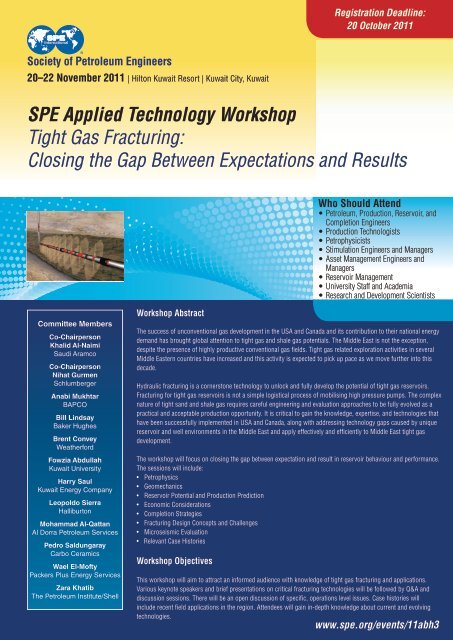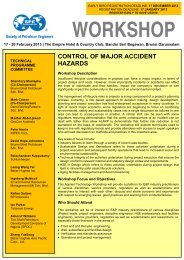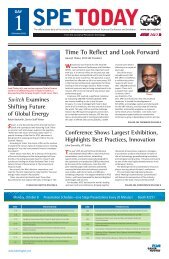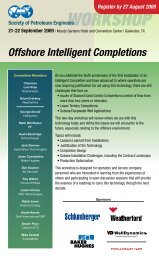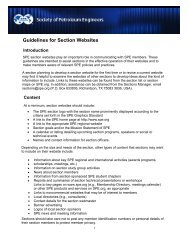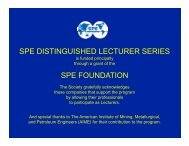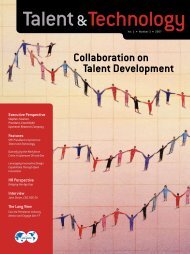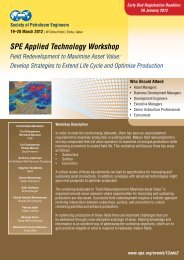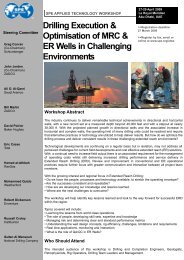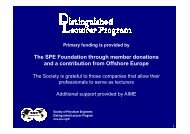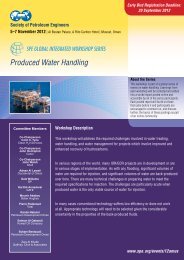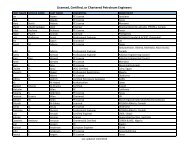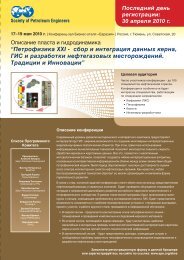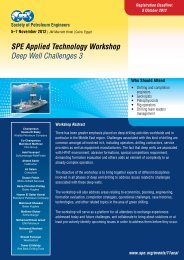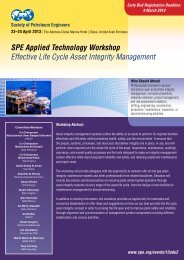Workshop Brochure - Society of Petroleum Engineers
Workshop Brochure - Society of Petroleum Engineers
Workshop Brochure - Society of Petroleum Engineers
You also want an ePaper? Increase the reach of your titles
YUMPU automatically turns print PDFs into web optimized ePapers that Google loves.
Registration Deadline:<br />
20 October 2011<br />
<strong>Society</strong> <strong>of</strong> <strong>Petroleum</strong> <strong>Engineers</strong><br />
20–22 November 2011 | Hilton Kuwait Resort | Kuwait City, Kuwait<br />
SPE Applied Technology <strong>Workshop</strong><br />
Tight Gas Fracturing:<br />
Closing the Gap Between Expectations and Results<br />
Who Should Attend<br />
• <strong>Petroleum</strong>, Production, Reservoir, and<br />
Completion <strong>Engineers</strong><br />
• Production Technologists<br />
• Petrophysicists<br />
• Stimulation <strong>Engineers</strong> and Managers<br />
• Asset Management <strong>Engineers</strong> and<br />
Managers<br />
• Reservoir Management<br />
• University Staff and Academia<br />
• Research and Development Scientists<br />
Committee Members<br />
Co-Chairperson<br />
Khalid Al-Naimi<br />
Saudi Aramco<br />
Co-Chairperson<br />
Nihat Gurmen<br />
Schlumberger<br />
Anabi Mukhtar<br />
BAPCO<br />
Bill Lindsay<br />
Baker Hughes<br />
Brent Convey<br />
Weatherford<br />
Fowzia Abdullah<br />
Kuwait University<br />
Harry Saul<br />
Kuwait Energy Company<br />
Leopoldo Sierra<br />
Halliburton<br />
Mohammad Al-Qattan<br />
Al Dorra <strong>Petroleum</strong> Services<br />
Pedro Saldungaray<br />
Carbo Ceramics<br />
Wael El-M<strong>of</strong>ty<br />
Packers Plus Energy Services<br />
Zara Khatib<br />
The <strong>Petroleum</strong> Institute/Shell<br />
<strong>Workshop</strong> Abstract<br />
The success <strong>of</strong> unconventional gas development in the USA and Canada and its contribution to their national energy<br />
demand has brought global attention to tight gas and shale gas potentials. The Middle East is not the exception,<br />
despite the presence <strong>of</strong> highly productive conventional gas fields. Tight gas related exploration activities in several<br />
Middle Eastern countries have increased and this activity is expected to pick up pace as we move further into this<br />
decade.<br />
Hydraulic fracturing is a cornerstone technology to unlock and fully develop the potential <strong>of</strong> tight gas reservoirs.<br />
Fracturing for tight gas reservoirs is not a simple logistical process <strong>of</strong> mobilising high pressure pumps. The complex<br />
nature <strong>of</strong> tight sand and shale gas requires careful engineering and evaluation approaches to be fully evolved as a<br />
practical and acceptable production opportunity. It is critical to gain the knowledge, expertise, and technologies that<br />
have been successfully implemented in USA and Canada, along with addressing technology gaps caused by unique<br />
reservoir and well environments in the Middle East and apply effectively and efficiently to Middle East tight gas<br />
development.<br />
The workshop will focus on closing the gap between expectation and result in reservoir behaviour and performance.<br />
The sessions will include:<br />
• Petrophysics<br />
• Geomechanics<br />
• Reservoir Potential and Production Prediction<br />
• Economic Considerations<br />
• Completion Strategies<br />
• Fracturing Design Concepts and Challenges<br />
• Microseismic Evaluation<br />
• Relevant Case Histories<br />
<strong>Workshop</strong> Objectives<br />
This workshop will aim to attract an informed audience with knowledge <strong>of</strong> tight gas fracturing and applications.<br />
Various keynote speakers and brief presentations on critical fracturing technologies will be followed by Q&A and<br />
discussion sessions. There will be an open discussion <strong>of</strong> specific, operations level issues. Case histories will<br />
include recent field applications in the region. Attendees will gain in-depth knowledge about current and evolving<br />
technologies.<br />
www.spe.org/events/11abh3
WORKSHOP<br />
Tight Gas Fracturing: Closing the Gap Between Expectations and Results<br />
Schedule<br />
Sponsorship Support<br />
Sponsorship support helps <strong>of</strong>fset the cost<br />
<strong>of</strong> producing workshops and allows SPE<br />
to keep the attendance price within reach<br />
<strong>of</strong> operations-level individuals, those<br />
who benefit most from these technical<br />
workshops.<br />
Sponsors benefit both directly and<br />
indirectly by having their names associated<br />
with a specific workshop.<br />
While SPE prohibits any type <strong>of</strong><br />
commercialism within the conference<br />
hall itself, the society recognises that<br />
sponsoring companies <strong>of</strong>fer valuable<br />
information to attendees outside the<br />
technical sessions.<br />
Sponsorship Categories<br />
Sponsorships are <strong>of</strong>fered on a first come<br />
basis. Please contact SPE to verify the<br />
availability <strong>of</strong> a particular sponsorship.<br />
Existing sponsors have the opportunity to<br />
renew the same level <strong>of</strong> sponsorship for<br />
annual workshops.<br />
• Titanium Sponsorship<br />
• Platinum Sponsorship<br />
• Gold Sponsorship<br />
• Silver Sponsorship<br />
• Bronze Sponsorship<br />
• Welcome Reception and Dinner<br />
• Luncheons–Per Day<br />
• C<strong>of</strong>fee Breaks–Per Day<br />
Sponsorship Benefits<br />
In addition to onsite recognition; SPE will<br />
recognise sponsors on the SPE website<br />
and in all printed material for the workshop.<br />
Based on the sponsorship selected,<br />
sponsoring companies also receive logo<br />
visibility on promotional workshop items.<br />
For More Information<br />
For a detailed list <strong>of</strong> available<br />
sponsorships, including benefits and<br />
pricing, contact Mohammed Aamer, at<br />
maamer@spe.org.<br />
SAVE USD 500<br />
BY REGISTERING<br />
BEFORE<br />
20 OCTOBER 2011<br />
Sunday, 20 November: Tight Gas Reservoir Characterisation<br />
0730–0800 hours Badge Collection, Welcome C<strong>of</strong>fee, and Refreshments<br />
0800–0815 hours Opening Ceremony<br />
0815–0830 hours C<strong>of</strong>fee Break<br />
0830–0900 hours Keynote Speaker<br />
0900–1010 hours Session 1: Petrophysics<br />
This session will address the challenges encountered during planning, execution, and evaluation <strong>of</strong><br />
unconventional and tight gas discoveries, during field development planning and through formation evaluation<br />
in support <strong>of</strong> both exploratory and development wells. The focus will be on sharing best practices in:<br />
• Planning, acquisition, and integration <strong>of</strong> all petrophysical data into a model incorporating information from<br />
wireline and MWD/LWD, logs, core sampling and measurements, fluid sampling, well integrity and<br />
formation imaging logs, formation pressure and temperature measurements, and production logging<br />
• Learnings from the regional petrophysical studies<br />
• Benefits and limitations <strong>of</strong> latest tools and techniques, for example, the analyses <strong>of</strong> density and neutron<br />
responses to estimate gas saturation and to quantify fresh water bearing from gas bearing sandstones<br />
1010–1030 hours C<strong>of</strong>fee Break<br />
1030–1110 hours Session 2: Geomechanics <strong>of</strong> Tectonically Active Basins<br />
The purpose <strong>of</strong> this session is to integrate geological properties with engineering rock studies for the purpose<br />
<strong>of</strong> oil and gas production. The application <strong>of</strong> geomechanics is useful in many studies such as; the study <strong>of</strong><br />
bore hole orientation relative to the fractures and fault distribution, bore hole stability with emphasis on the<br />
effect <strong>of</strong> compaction and subsidence <strong>of</strong> the sediments, as well as the casing and mud weight required for such<br />
bore holes.<br />
Plate tectonic movement creates different types <strong>of</strong> sedimentary basins. They might be related to tension<br />
forces, like the rift basin, or compressional forces like the back-arc basin that is associated with trenches in<br />
the subduction zone.<br />
The stress applied by plate tectonic movement on the sedimentary rocks accumulated in these basins causes<br />
rock deformations on different scales, from mountain building size to macro and microscopic sizes.<br />
The stress created in these basins has many important effects on rock behaviour. Rocks may change<br />
plastically by folding or may rupture and form faults, fractures, and joints. Rock mechanics and geomechanics<br />
deal with rocks stress-strain behaviour. The rock behaviour is affected by different factors such as its lithology,<br />
porosity, permeability, temperature, pressure, fluid type, and amount. The result <strong>of</strong> stress on rocks, such as<br />
fractures, has an important effect on fluid movement, migration, and trapping.<br />
Reservoir rock geomechanics is the integration study <strong>of</strong> stress on pore pressure, fracture and fault<br />
distribution, physical properties <strong>of</strong> the rock, and the effect <strong>of</strong> the over-burden pressure created by sedimentary<br />
rock column. This might be applied on cap rocks, as well as, total trap configuration system.<br />
1110–1200 hours Panel Discussion<br />
1200–1300 hours Luncheon<br />
1300–1400 hours Session 3: Reservoir Potential and Production Prediction<br />
This session will address the current status <strong>of</strong> reservoir performance evaluation methods, the parameters to<br />
be considered, and how to optimise the production and recovery <strong>of</strong> the unconventional gas reservoirs.<br />
Reservoir potential and production prediction for unconventional gas reservoirs require better understanding<br />
<strong>of</strong> flow mechanism and additional parameters to define the reservoir quality, compared higher-permeability,<br />
conventional reservoirs. On an individual well basis, an unconventional gas reservoir will produce less gas<br />
over a longer period <strong>of</strong> time. Therefore, the conventional practice <strong>of</strong> reservoir engineering must be redefined<br />
for unconventional reservoirs. Flow mechanism <strong>of</strong> free gas, gas release from porosity within kerosene for<br />
shale gas are a few challenges for reservoir engineers to consider. The reservoir performance modelling<br />
and analytical method related to stimulated reservoir volume defined by microseismic measurement will be<br />
reviewed.<br />
1410–1440 hours C<strong>of</strong>fee Break<br />
1440–1520 hours Session 4: Economic Considerations<br />
The region has vast resources <strong>of</strong> natural gas available for extraction. Finding gas isn’t necessarily the<br />
problem. According to industry sources, more than half <strong>of</strong> the gas exploratory wells drilled so far encountered<br />
some form <strong>of</strong> hydrocarbons. However, most were in deep, tight reservoirs or contained high pressure and<br />
dangerous levels <strong>of</strong> hydrogen sulphide. Furthermore, the mandatory government low sales price won’t make it<br />
economic to develop the difficult plays.<br />
Economically producing gas from deep tight gas reservoirs is the next level <strong>of</strong> the economic recovery<br />
challenge. The volume and long-term potential <strong>of</strong> deep tight gas resources are driving technical progress.<br />
There could be much more natural gas than previously known in areas where industry has been unable to<br />
fully explore, and new technologies allow us to access resources previously thought unreachable. Increasing<br />
demand and improved deep tight gas technologies promise to bring deep gas into the forefront <strong>of</strong> our future<br />
gas resources.<br />
Tight gas has, in recent years, become more conventional. Deep drilling, exploration, and extraction<br />
techniques have substantially improved, making drilling for deep tight gas economical. However, deep gas is<br />
still more expensive to produce than conventional natural gas, and as such, economic conditions have to be<br />
such that it is pr<strong>of</strong>itable for the industry to extract from these sources.<br />
1520–1610 hours Panel Discussion
Monday, 21 November: Tight Gas Reservoir Completion<br />
(Design and Fracturing Completion)<br />
www.spe.org/events/11abh3<br />
0830–0900 hours Keynote Speaker<br />
0900–1010 hours Session 5: Completion Challenges and Strategies<br />
Unconventional gas reservoirs in high-pressure, high-temperature (HPHT) conditions cannot be produced<br />
with existing tools and conventional methodologies. Maximising return in these environments needs the best<br />
completion design for the life <strong>of</strong> the well and long-term production <strong>of</strong> the reservoir. Well deviation, drilling<br />
direction, multi-stage hardware, hydraulic fracturing design, and execution are all major contributors to the<br />
long-term success <strong>of</strong> a project. Therefore, all these factors need to be optimised in an integrated process that<br />
takes the interactions between them into account and with hydraulic fracturing in mind from the start. This<br />
session will discuss the challenges and <strong>of</strong>fer strategies to increase odds <strong>of</strong> success.<br />
1010–1040 hours C<strong>of</strong>fee Break<br />
1040–1130 hours Session 6: Advances in Multi-Stage and Emerging Technologies<br />
This session presents the latest developments that have been made available to the industry in multistage<br />
fracturing technologies. Development <strong>of</strong> tight gas reservoirs has evolved to increasingly complex and lower<br />
permeability reservoirs. In this setting conventional well completions have been pushed to the limit in their<br />
ability to deliver economically viable wells. In order to respond to this challenge and improve economics, the<br />
industry has turned to horizontal wells with multiple hydraulic fractures. The several completion tools and<br />
placement techniques developed enable maximised production from increased reservoir contact in a cost<br />
efficient manner by optimising the utilisation <strong>of</strong> both the personnel and equipment needed to perform the work.<br />
1130–1220 hours Panel Discussion<br />
1220–1320 hours Luncheon<br />
1320–1420 hours Session 7: Challenges in Resources, Logistics, and Operations<br />
This session will discuss the resources, logistics, and operations challenges letting the presenters share their<br />
experiences to overcome them.<br />
Optimal production <strong>of</strong> any tight gas producer environment is highly dependent on the quality <strong>of</strong> the stimulation<br />
process implemented to maximise the productivity. Since most <strong>of</strong> the tight gas producing wells are located in<br />
remote, deep, and HPHT environments; any stimulation process needs to overcome the resources, logistics,<br />
and operation challenges. Deep or ultra-deep and high pressure environments demand the use <strong>of</strong> high density<br />
fracturing fluids or the use <strong>of</strong> 20K fracturing equipment that are not available in all areas. At the same time the<br />
water, chemicals, proppants supply, or equipment are additional problems from the logistics and operations<br />
point <strong>of</strong> view. In almost all the cases these challenges limit the normal flexibility that operator and service<br />
companies need to have to optimise the stimulation process.<br />
1430–1500 hours C<strong>of</strong>fee Break<br />
1500–1600 hours Session 8: Case Histories<br />
In this session we’ll explore the evolution <strong>of</strong> fracturing technologies applied to unconventional reservoirs<br />
through time, the suitability and adoption <strong>of</strong> conventional technologies as well as the failures that lead to<br />
the evolution and creation <strong>of</strong> new fit for purpose techniques. Case histories will be presented to illustrate the<br />
adoption and development cycle <strong>of</strong> fracturing technologies applied to unconventional reservoirs.<br />
As the oil and gas industry extends to new frontiers at hand, conventional technology is typically applied<br />
first. Initial success greatly depends on the suitability <strong>of</strong> the existing technology to the new environment.<br />
As experience is gained, the conventional approach is either validated or the need to switch paradigms is<br />
uncovered.<br />
1600–1650 hours Panel Discussion<br />
Tuesday, 22 November: Tight Gas Fracturing Evaluation<br />
0830–0900 hours Keynote Speaker<br />
0900–1030 hours Session 9: Advances in Fracture Geometry Evaluation<br />
This session will introduce the concepts as well as discuss the advances made in fracture geometry evaluation.<br />
Height is a critical design parameter in hydraulic fracturing design. The ability to measure this parameter would<br />
allow one to calibrate the stress model above and below a formation. If this fracture height information is<br />
coupled with a fracture model, one can get the full picture about the fracture geometry created by a stimulation<br />
design. In turn, the designs get closer to reality leading to modifications enabling optimal drainage and<br />
recovery from a reservoir. There have been critical technology introductions in the industry to enable these<br />
measurements in a environmentally safe and cost-effective way.<br />
1030–1100 hours C<strong>of</strong>fee Break<br />
1100–1150 hours Session 10: Microseismic<br />
The latest developments in microseismic technologies will be presented in this session by leading industry<br />
providers. The propagation <strong>of</strong> hydraulic fractures in unconventional plays is far from the classical bi-wing frac<br />
assumed in typical treatments. The use <strong>of</strong> slick water treatments in shale plays intently seeks at generating<br />
complex fracture geometries in order to contact as much rock as possible, today we speak <strong>of</strong> “Stimulated<br />
Volumes” rather than frac length and height. The success <strong>of</strong> a treatment is heavily dependent on being able<br />
to create this complex fracturing network, it is therefore critical to understand how fractures propagate and<br />
how much rock volume is contacted. Microseismic surveys are at the forefront in providing an answer to this<br />
challenge.<br />
1150–1240 hours Panel Discussion<br />
1240–1255 hours Wrap-Up and <strong>Workshop</strong> Closing Remarks by <strong>Workshop</strong> Co-Chairpersons<br />
1255–1400 hours Luncheon<br />
<strong>Workshop</strong> Venue<br />
Hilton Kuwait Resort<br />
PO Box 7887<br />
Kuwait City<br />
Kuwait<br />
Tel: 965.2225.6222<br />
Fax: 965.2225.6290<br />
Email: reservations.kuwait@hilton.com<br />
<strong>Workshop</strong> Guidelines<br />
Format<br />
Three (3) days <strong>of</strong> informal discussions prompted<br />
by selected keynote presentations and<br />
discussions. <strong>Workshop</strong>s maximise the exchange<br />
<strong>of</strong> ideas among attendees and presenters<br />
through brief technical presentations followed by<br />
extended Q&A periods. Focused topics attract<br />
an informed audience eager to discuss issues<br />
critical to advancing both technology and best<br />
practices. The majority <strong>of</strong> the presentations are in<br />
the form <strong>of</strong> case studies, highlighting engineering<br />
achievements, and lessons learnt. In order to<br />
stimulate frank discussion, no proceedings are<br />
published and the press is not invited to attend.<br />
Documentation<br />
• Proceedings will not be published; therefore,<br />
formal papers, and handouts are not expected<br />
from speakers.<br />
• Work in progress, new ideas, and interesting<br />
projects are sought.<br />
• Pr<strong>of</strong>essionally-prepared visual aids are not<br />
required; handwritten view graphs are entirely<br />
acceptable.<br />
• Note-taking by participants is encouraged.<br />
Poster Session<br />
The Steering Committee encourages<br />
registrations from pr<strong>of</strong>essionals who are able<br />
to prepare and present a poster on a relevant<br />
project. For further details kindly contact<br />
Mohammed Aamer, event specialist at<br />
maamer@spe.org.<br />
Attendance<br />
Registrations will be accepted on a first-come,<br />
first-serve basis. The Steering Committee<br />
encourages attendance from those who can<br />
contribute to the workshop most effectively either<br />
in discussions or with posters. A mix <strong>of</strong> attendees<br />
in terms <strong>of</strong> geographic origin, companies, and<br />
disciplines will be encouraged.<br />
<strong>Workshop</strong> Deliverables<br />
• The Steering Committee will appoint a “scribe”<br />
to record the discussions and to produce the<br />
full workshop report for SPE.<br />
• This report will be circulated to all attendees<br />
as the workshop deliverable within 4–6 weeks<br />
following the workshop. The copyright <strong>of</strong> the<br />
report is with SPE.<br />
• PowerPoint presentation materials will be<br />
posted on a specific SPE URL address after<br />
the workshop. Provision <strong>of</strong> the materials by<br />
the speakers will signify their permission for<br />
SPE to do so.<br />
Commercialism<br />
In keeping with ATW objectives and the<br />
SPE mission, commercialism in posters or<br />
presentations will not be permitted. Company<br />
logos must be limited to the title slide and used<br />
only to indicate the affiliation <strong>of</strong> the presenter and<br />
others involved in the work.<br />
Attendance Certificate<br />
All attendees will receive an attendance certificate<br />
attesting to their participation at the workshop.<br />
This certificate will be provided in exchange for a<br />
completed <strong>Workshop</strong> Questionnaire.<br />
Continuing Education Units<br />
Attendees at this workshop qualify for SPE<br />
Continuing Education Units (CEU) at the rate <strong>of</strong><br />
0.1 CEU per hour <strong>of</strong> the workshop.<br />
PLEASE USE INSIDE FORM FOR REGISTRATION
REGISTRATION FORM<br />
Tight Gas Fracturing: Closing the Gap Between Expectations and Results<br />
20–22 November 2011, Hilton Kuwait Resort, Kuwait City, Kuwait<br />
Important: Attendance is limited and is not guaranteed. Early registration is recommended. Please print or type in black ink.<br />
Registration Fee MUST be paid in advance for attending the Applied Technology <strong>Workshop</strong>.<br />
First Name/Forename__________________________________________________ Middle Name___________________________________________________<br />
Last/Family Name________________________________________________________________________________________ SPE Member? ❒ Yes ❒ No<br />
Member No.__________________________________________ Job Title_____________________________________________________________________<br />
Company/Organisation_______________________________________________________________________________________________________________<br />
Street or P.O. Box Number_____________________________________________________________________ City___________________________________<br />
State/Province___________________________________ Zip/Postal Code___________________________ Country___________________________________<br />
Telephone____________________________________________ Facsimile<br />
Email (required)____________________________________________________________________________________________________________________<br />
WORKSHOP<br />
Applied Technology <strong>Workshop</strong> Fee*: Before 20 October 2011 ❒ USD 1,350 for SPE Members ❒ USD 1,550 for Nonmembers<br />
After 20 October 2011 ❒ USD 1,850 for SPE Members ❒ USD 2,050 for Nonmembers<br />
<strong>Workshop</strong> Fee includes: Technical sessions, materials, daily c<strong>of</strong>fee breaks and luncheons, welcome reception and dinner (if applicable).<br />
Accommodation is NOT included in the workshop registration fee.<br />
IMPORTANT: All fees paid to SPE are net <strong>of</strong> taxes. The registration fees in this form do not include any local or withholding taxes. All such taxes will be added<br />
to the above-mentioned registration fees in the invoice.<br />
Do you wish to present a poster? (subject to selection) ❒ Yes ❒ No<br />
Do you wish to be considered a Discussion Leader? (subject to selection) ❒ Yes ❒ No<br />
If yes, please indicate which subject you would like to present on:<br />
Credit Card (Check One): ❒ American Express ❒ MasterCard ❒ Visa<br />
NO REFUNDS will be granted on cancellations on or after 13 November 2011.<br />
Card Number (will be billed through <strong>Society</strong> <strong>of</strong> <strong>Petroleum</strong> <strong>Engineers</strong>) Expiration Date (mm/yy) Security Code<br />
Name <strong>of</strong> Credit Card Holder (printed) _________________________________________________________________________________________________<br />
Signature (required)___________________________________________________________________________ Date_______________________________<br />
Please inform us <strong>of</strong> mobility or special dietary needs_____________________________________________________________________________________<br />
Payment by Bank Transfer: IMPORTANT–For reference: Please quote “11ABH3” and name <strong>of</strong> delegate<br />
Make Payment to: HSBC Bank Middle East Ltd, Jebel Ali Branch, P.O. Box 66, Dubai, UAE<br />
Account Name: SPE Middle East DMCC Account Number: 036-217131-100 Swift Code: BBMEAEAD<br />
Cancellation and Refund Policy:<br />
• A processing fee <strong>of</strong> USD 100 will be charged for cancellations received before the registration deadline 20 October 2011.<br />
• For cancellations received after the registration deadline, 20 October, 25% refund will be made to the registrant.<br />
• No refund on cancellations received within seven (7) days prior to the workshop date, i.e. on or after 13 November 2011.<br />
• No refund will be issued if a registrant fails to attend the workshop.<br />
Not an SPE Member?<br />
Join SPE when you register and<br />
save money by paying the lower<br />
member registration fee.<br />
A portion <strong>of</strong> your dues is<br />
allocated to a JPT subscription<br />
and is not deductible or refundable.<br />
Visa:<br />
SPE Middle East, North Africa and India will assist in providing a visa invitation letter, upon request in writing, to confirmed registrants after receiving full payment <strong>of</strong> registration fees.<br />
Visa invitation letters take five days to issue from the date <strong>of</strong> request and it is the delegate’s responsibility to obtain their own visa. SPE cannot issue the visa nor can we guarantee it<br />
will be obtained.<br />
For questions or additional information contact: Mohammed Aamer at maamer@spe.org.<br />
11ABH3<br />
To submit your registration online, please visit the event’s website at: www.spe.org/events/11abh3<br />
Alternatively, you can email this form to: formsdubai@spe.org, or fax it to: +971.4.457.3164.


